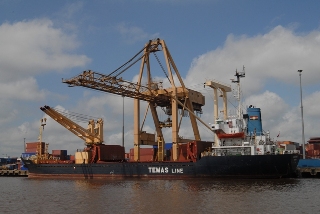 Ports in Indonesia have been ordered to observe shorter holding times for containers to ease congestion at their terminals.
Ports in Indonesia have been ordered to observe shorter holding times for containers to ease congestion at their terminals.
The government has told ports to hold storage containers for up to seven days only in order to improve waiting times, and said that boxes found to be overstaying will be seized by port authorities and turned over to the customs and excise department for appropriate action, according to a report by The Jakarta Post.
Coordinating Economic Minister Chairul Tanjung said the seven-day rule was already an existing policy that the government is now trying to implement strictly.
This comes after the administration announced last month that it would impose stringent measures and harsh penalties to hasten cargo flow at ports, particularly at Tanjung Priok, the country’s main shipping gateway that is getting flak for congestion and long dwell times.
These measures would include more stringent monitoring of unclaimed containers, encouraging 24-hour operation of port stakeholders, implementing an IT-based system for paperwork, and fast-tracking all ongoing construction projects at the port.
Chairul said the administration would be promoting awareness of the new measures over the next three months and levy criminal charges for noncompliance.
The government also instructed state-owned port operator PT Pelabuhan Indonesia II (Pelindo II) to reserve parking spaces for trucks to relieve traffic at Tanjung Priok.
In related news, Pelindo II has asked the coordinating economic minister to change the ruling obliging seaports to stop using U.S. dollars in transactions with customers in favor of the local currency.
In seeking a reversal of the decision, Pelindo II president director Richard Joost Lino said that the port operator should be allowed to use dollars since its transactions were legally considered to be international transactions.
In addition, Lino said the ruling would dissuade foreign investors from investing in Indonesian ports because it would raise their investment risk.
Chairul earlier this month said Pelindo II’s use of U.S. dollars in its dealings with customers was unlawful, since the 2011 Currency Law stipulates that all domestic transactions should be in rupiah. He further said Pelindo II had three months to switch the currency to rupiah.




